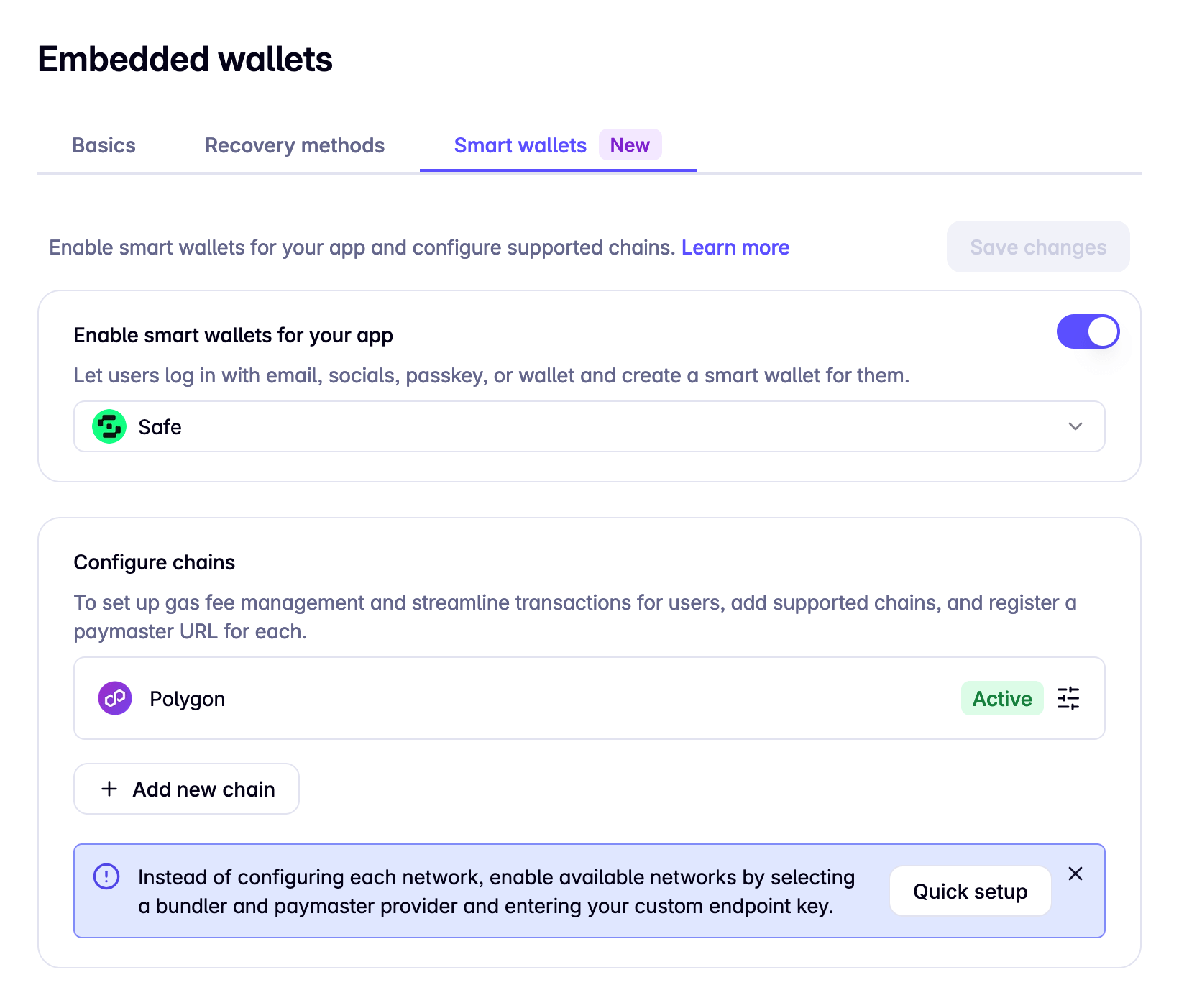Implement Social Login in your app
To implement this integration, you are required to have an existing app that is already connected to the protocol.
Prerequisites
We use privy.io as an authentication and key management provider. So:
- Register an account at dashboard.privy.io and create a project (name will be passed to WalletConnect).
- Go to “Embedded wallets” page, open “Smart wallets” tab:
- Enable it and select
Safeoption; - Configure chains. We recommend to use Pimlico:
- Register at their dashboard and copy API key.
- Return to privy page, press “Quick setup”, select “Pimlico”, paste API key and choose your primary app chain (Polygon, Gnosis, or Amoy, if you’re setting up dev env).
- Enable it and select
- Go to “Login methods”, open “Socials” tab and enable methods you want.
- Go to “Settings” page and copy
App IDof your project.
You must have at least one chain configured, we recommend to use just one chain for smart wallets and hide chain switcher from UI for such users.

Installation
Run
npm install @azuro-org/sdk-social-aa-connectorIf you’re using @azuro-org/sdk, update it to the latest version, it supports sdk-social-aa-connector since version 5.3.0.
Setup
Update configs and providers
- Replace wagmiConfig creation by
createConfigfrom@privy-io/wagmi(this package is already installed):
import { http, cookieStorage, createStorage } from 'wagmi'
import { createConfig } from '@privy-io/wagmi'
export const wagmiConfig = createConfig({
/* the same options as you have */
})- Create privyConfig, discover available options in the Privy Docs:
import { http, cookieStorage, createStorage } from 'wagmi'
import { createConfig } from '@privy-io/wagmi'
import type {PrivyClientConfig} from '@privy-io/react-auth'
export const wagmiConfig = createConfig({
/* the same options as you have */
})
export const privyConfig: PrivyClientConfig = {
walletConnectCloudProjectId: 'Your-WALLET-CONNECT-Project-ID',
loginMethods: [ 'wallet', 'email', 'google', 'twitter', 'farcaster', 'discord', 'instagram' ],
appearance: {
theme: 'dark',
showWalletLoginFirst: true,
},
}- Replace
WagmiProviderfromwagmiwithPrivyProviderfrom@azuro-org/sdk-social-aa-connector:
import { QueryClientProvider } from '@tanstack/react-query'
import { PrivyProvider } from '@azuro-org/sdk-social-aa-connector'
import { wagmiConfig, privyConfig } from './config'
import { queryClient } from './queryClient'
export const Providers = ({ children, initialWagmiState, initialChainId }) => {
return (
<QueryClientProvider client={queryClient}>
<PrivyProvider
appId="your-App-ID-from-privy-dashboard"
privyConfig={privyConfig}
wagmiConfig={wagmiConfig}
initialWagmiState={initialWagmiState}
>
<AzuroSDKProvider initialChainId={initialChainId}>
{children}
</AzuroSDKProvider>
</PrivyProvider>
</QueryClientProvider>
)
}Replace useAccount import
@azuro-org/sdk-social-aa-connector exports useAccount hook which is extended version of useAccount from “wagmi”.
For web2 users (who logged in via email or social network), it replaces address property to generated smart account (for web3 users, it isn’t changed),
and provides account.isAAWallet flag to simplify detecting in you app logic.
import { useAccount } from '@azuro-org/sdk-social-aa-connector'
const Component = () => {
const { address, isAAWallet, ...restWagmiUseAccountFields } = useAccount()
console.log({
// Smart Wallet address for web2, default wallet signer address for web3
address,
isAAWallet,
})
// ...
}Replace Connect handlers to privy:
Use privy connect instead of your existing one:
import { usePrivy } from '@privy-io/react-auth'
import { useAccount } from '@azuro-org/sdk-social-aa-connector'
export const ConnectButton = () => {
const { address } = useAccount()
const { connectOrCreateWallet, ready } = usePrivy()
if (!address) {
return (
<button type="button" onClick={() => connectOrCreateWallet()}>Connect Wallet</button>
)
}
return <>Your connected state view</>
}Withdrawals Logic
It’s important to add withdrawal from user smart accounts UI and logic.
To act with user’s smart account, use walletClient from useAAWalletClient hook from @azuro-org/sdk-social-aa-connector.
Read Privy “Using smart wallets” docs
Example of usage (simplified, not verified):
import { useState } from 'react'
import { isAddress, erc20Abi, parseUnits, encodeFunctionData } from 'viem'
import { useBalance, usePublicClient } from 'wagmi'
import { useAccount, useAAWalletClient } from '@azuro-org/sdk-social-aa-connector'
import { useChain } from "@azuro-org/sdk"
export const WithdrawalForm = () => {
const { address } = useAccount()
const aaWalletClient = useAAWalletClient()
const publicClient = usePublicClient()
const { appChain, betToken } = useChain()
const { isLoading, data, error, refetch } = useBalance({
chainId: appChain.id,
address,
token: betToken.address,
})
const [ isSubmitting, setIsSubmitting ] = useState<boolean>(false)
const [ recipientAddress, setRecipientAddress ] = useState<string>('')
const [ amount, setAmount ] = useState<string>('')
const [ txHash, setTxHash ] = useState<`0x${string}` | undefined>()
const withdraw = async () => {
// handle it more granular and show feedback to the user
if (!isAddress(recipientAddress) || !aaWalletClient || !data?.value || !+amount) {
return
}
const fixedAmount = (+amount).toFixed(betToken.decimals)
const rawAmount = parseUnits(fixedAmount, betToken.decimals)
if (rawAmount > data.value) {
// show error
return
}
setIsSubmitting(true)
try {
const hash = await aaWalletClient.sendTransaction({
account: aaWalletClient.account,
chain: appChain,
to: betToken.address,
data: encodeFunctionData({
abi: erc20Abi,
functionName: 'transfer',
args: [
recipientAddress,
rawAmount,
],
})
})
const receipt = await publicClient!.waitForTransactionReceipt({
hash,
})
refetch()
}
catch (error) {
console.error(error)
}
setIsSubmitting(false)
}
if (!address) {
return <ConnectButton />
}
const submit = (event) => {
event.preventDefault()
if (isSubmitting) {
return
}
withdraw()
}
return (
<form aria-busy={isSubmitting} action="." onSubmit={submit}>
<div>Balance: {isLoading ? 'loading...' : (+data?.formatted || 0).toFixed(4)}</div>
<label className="block">
<span className="text-md text-zinc-400">Amount to withdraw</span>
<input
className="w-[140px] py-2 px-4 border border-zinc-400 text-md text-right font-semibold rounded-md"
type="number"
placeholder="Amount to withdraw"
value={amount}
onChange={(event) => setAmount(event.target.value)}
/>
</label>
<label className="block">
<span className="text-md text-zinc-400">Recipient address</span>
<input
className="w-[140px] py-2 px-4 border border-zinc-400 text-md text-right font-semibold rounded-md"
type="text"
placeholder="Recipient address"
value={recipientAddress}
onChange={(event) => setRecipientAddress(event.target.value)}
/>
</label>
</form>
)
}If you don’t use SDK
Just do the same setup, use @azuro-org/sdk-social-aa-connector
and work with user’s smart account by viem walletClient drop-in replacement from useAAWalletClient.
import { useAccount, useAAWalletClient } from '@azuro-org/sdk-social-aa-connector'
import { useWalletClient } from 'wagmi'
const Component = () => {
const { address, isAAWallet } = useAccount()
const aaWalletClient = useAAWalletClient()
const { data: defaultWalletClient } = useWalletClient()
const sendTxExample = async () => {
const to ='0x...'
const data ='0x...'
const txHash = isAAWallet
? await aaWalletClient.sendTransaction({ to, data, account: aaWalletClient.account, chain: appChainTakenFromViem })
: await defaultWalletClient.sendTransaction({ to, data })
}
}Read Privy “Using smart wallets” docs for more details, e.g. signing messages.